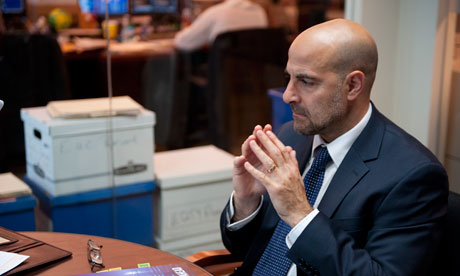
Margin Call (2012)
Director: J C Chandor
Entertainment grade: C
History grade: B+
During the global financial crisis of September 2008, Lehman Brothers – the fourth-largest bank in the US – filed for bankruptcy.
Finance
It's just another day in 2008 for Margin Call's unnamed investment bank, which is based on Lehman Brothers. Profits are down and 80% of the staff on the trading floor are being laid off. Among those cut is Eric Dale (Stanley Tucci), head of risk management. As he is ushered out by a security guard, he slips a key drive to his erstwhile minion Peter Sullivan (Zachary Quinto). "I was working on something, but they wouldn't let me finish it," he hisses. "Be careful." Peter takes a look, and quickly realises Unnamed Investment Bank Based on Lehman Brothers is so far up a certain creek that even a paddle would only be of any use if they could all somehow commit hara-kiri with it.
Economics
Margin Call tries to make clear the reason for the problems at Unnamed Investment Bank, but whenever someone starts getting into the details it sounds like: "Well, sir, we're now leveraged up to our historical volatility index limits, and if you cross the streams in the flux capacitor Skynet will become self-aware at 2.14am Eastern Time." At least, that's what I wrote in my notes. I may have drifted off for a minute. So impossible is it to set out what's going on without immediately boring and confusing the audience that both Paul Bettany and Kevin Spacey have to ask Peter to explain it "in English". Finally they summon the big boss, John Tuld (Jeremy Irons), whose name hints that he may be based on real-life former Lehman CEO Dick Fuld. "Speak as you might to a small child," Tuld tells Peter. "Or as you would to a golden retriever." Unfortunately, it turns out that even faced with a golden retriever Peter would yammer on about things like trading security, product layering and market capitalisation. Maybe he's a cat person.
Responsibility
Perhaps no feature-length film can hope to convey what happened at Lehman Brothers, which was sufficiently complex to fill nine volumes of a court examiner's report in 2010. Margin Call manages to get it across that Unnamed Investment Bank has bought too many subprime mortgage assets and those have now turned out to be toxic, but it underplays the crisis in the rest of the banking sector at the time. Nor does the human drama ever hit the high pitch it needs, bearing in mind that this film has no sex, no violence, no explosions and no velociraptors – even though just a couple of those released into the boardroom would really have livened things up. It's just a lot of obscenely rich people standing around wearing suits, looking mildly disgruntled because they've just broken the world. Historically speaking, of course, this is realistic.
People
Most movies about business don't work, and the few that do pull it off by having whip-smart dialogue and characters you care about. Margin Call has neither. The ensemble cast, though fantastically talented, are used to modest effect. John Tuld is never allowed to be as fearsome as the real-life Dick Fuld, a man known as "the Gorilla of Wall Street". Neither of the whistleblowers, Eric and Peter, has enough screentime to carry the film as a hero. Kevin Spacey's character, trading-floor boss Sam Rogers, almost gets to be heroic, but spends much of the film moping about his chocolate labrador (no, not a golden retriever), which is slowly dying of incurable cancer. It's best not to look too closely at this storyline in case the labrador turns out to be less the faithful hound, more a clunky metaphor for capitalism. Again, it is realistic that everyone in the film is slightly hopeless rather than being a fully-fledged hero or villain – but people being slightly hopeless isn't that thrilling to watch.
Verdict
If there is a great movie to be made about the global financial crisis, Margin Call isn't quite it.

